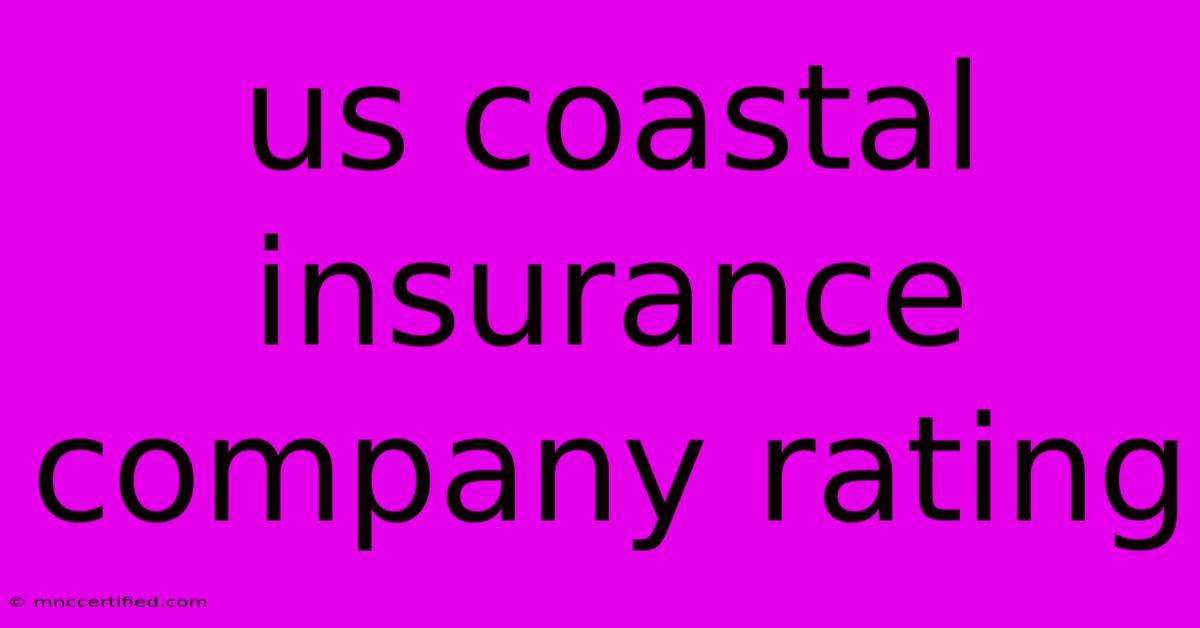Us Coastal Insurance Company Rating

Table of Contents
Navigating the Shore: US Coastal Insurance Company Ratings and What They Mean for You
Living near the coast brings breathtaking views and a unique lifestyle, but it also comes with the inherent risk of natural disasters. Finding reliable insurance is crucial, and understanding a company's financial strength and customer satisfaction is paramount. This guide delves into US Coastal Insurance Company ratings, examining their significance and how they can help you make informed decisions about your coverage.
Understanding Insurance Company Ratings
Insurance companies are evaluated by independent rating agencies like AM Best, Moody's, and Standard & Poor's to assess their financial health, operational efficiency, and ability to fulfill their obligations to policyholders. These ratings are expressed using a letter-based system, with higher letters indicating stronger financial stability.
Here's what the common ratings mean:
- A++ (Superior): The highest rating, indicating a company's exceptional financial strength and ability to meet its obligations even during challenging economic periods.
- A+ (Excellent): A strong financial foundation and a high likelihood of fulfilling its promises to policyholders.
- A (Very Good): A company with a solid financial profile, demonstrating its ability to handle most adverse scenarios.
- B (Good): Generally a financially sound company with a lower level of financial strength compared to higher-rated companies.
- C (Fair): A company with some financial weaknesses, raising concerns about its ability to meet its obligations in the long term.
- D (Poor): A company with significant financial challenges, making its ability to meet its obligations questionable.
US Coastal Insurance Company Rating Analysis
US Coastal Insurance Company is a relatively new player in the insurance market, specializing in coastal properties. Its focus on this niche area means its ratings are crucial for potential customers.
Currently, US Coastal Insurance Company has an A- rating from AM Best. This rating indicates a strong financial profile and a good ability to handle most challenges. It suggests that the company is well-positioned to meet its obligations to policyholders, even in the face of potential claims stemming from coastal events.
It's important to note:
- AM Best is just one of several rating agencies. Always research ratings from multiple sources to get a comprehensive picture of a company's financial health.
- Ratings are dynamic. They can change over time based on a company's financial performance, market conditions, and regulatory changes. It's crucial to stay updated on the latest ratings.
- Ratings are not the only factor to consider. While financial strength is important, also consider factors like customer service, policy options, and pricing when choosing an insurance provider.
Navigating Coastal Insurance Options
Finding the right coastal insurance is vital for protecting your valuable property. Here are some tips:
- Compare quotes from multiple companies. Don't settle for the first quote you get. Explore options and compare coverage, premiums, and ratings.
- Understand your specific needs. Consider your property's location, value, and potential risks, and choose a policy that offers adequate coverage.
- Look beyond just the rating. While ratings provide a valuable indicator, also consider factors like customer reviews, policy flexibility, and claims handling practices.
- Consult an insurance broker. A broker can help you navigate the complex world of insurance and find the best options tailored to your specific situation.
Conclusion: A Foundation for Informed Decisions
Understanding US Coastal Insurance Company ratings and the broader landscape of insurance company evaluations is crucial for making informed decisions about your coverage. By considering factors like financial strength, customer satisfaction, and policy options, you can find a reliable insurance provider to safeguard your coastal property and peace of mind.

Thank you for visiting our website wich cover about Us Coastal Insurance Company Rating. We hope the information provided has been useful to you. Feel free to contact us if you have any questions or need further assistance. See you next time and dont miss to bookmark.
Featured Posts
-
Margin Clause In Property Insurance
Nov 14, 2024
-
Verb Bonding Shampoo And Bonding Mask
Nov 14, 2024
-
Skai Jackson Stands By Partner After Allegations
Nov 14, 2024
-
Sri Lanka Wins Highlights Vs New Zealand
Nov 14, 2024
-
Stream Megalopolis Online Where To Watch
Nov 14, 2024